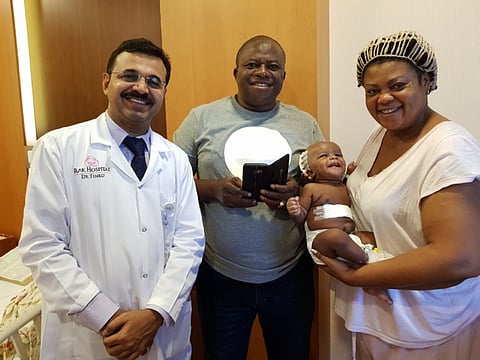Infant back to smiling self after brain surgery
Timely intervention at RAK Hospital saves four-month-old from potential brain damage and stunted development

Ras Al Khaimah: Doctors at RAK Hospital saved a four-month-old baby from brain damage or consequent mental retardation after carrying out a challenging brain surgery against many odds and in critical circumstances.
The infant, Abdullah, was flown in from his native Nigeria to Ras Al Khaimah with complaints of progressive swelling in his head due to a build-up of fluids in his brain. Due to deteriorated brain function, he had even lost the ability to smile.
“The surgery itself was not complicated, but the fact that patient was just a few months old presented a number of challenges,” explained Dr Tinku Jose Kurisinkal, consultant neurosurgeon at RAK Hospital who led the procedure.
The patient with his mother. Courtesy: RAK Hospital
“Baby Abdullah was suffering from what is known as congenital hydrocephalus, a condition where fluid accumulates within the brain either because of a blockage or the body’s inability to absorb the water. Ordinarily, this cerebrospinal fluid [CSF] protects the brain from mechanical injury, provides nourishment, and carries away waste; however, an excess amount could potentially result in developmental disorders,” the surgeon explained.
“In order to divert the fluid, a plastic tube called shunt was surgically implanted from the brain to create an alternate path from the head through the neck into the abdomen. However, given the very young age of the baby, the procedure was quite a difficult task. The procedure was further complicated since giving and maintaining anaesthesia in a newborn posed another challenge, but our team of anaesthetists managed it smoothly. We also had to take extra precaution to prevent infection to avoid post-op complications,” added Dr Kurisinkal.
The surgery lasted for about 90 minutes and, upon recovery from anesthesia, the baby regained consciousness immediately and the smile was back on his face. He was prescribed short-term anti-seizure medication to prevent any post-surgery seizures and, within days, his parents were able to take him home.
As per a recent research, the incidence of congenital hydrocephalus cases is highest in Africa and Latin America (145 and 316 per 100,000 births, respectively). Symptoms of the disease in an infant include rapid increase in the size of the head, a bulging or tense soft spots on the top of the head, vomiting, sleepiness, irritability, poor feeding, seizures, deficits in muscle tone and strength, poor responsiveness to touch, and poor growth.
“This case is yet another fine example of how RAK Hospital is emerging as a preferred destination of medical tourism, particularly for performing complicated surgeries,” said Dr Raza Seddiqi, CEO at Arabian Healthcare Group and Executive Director at RAK Hospital.


